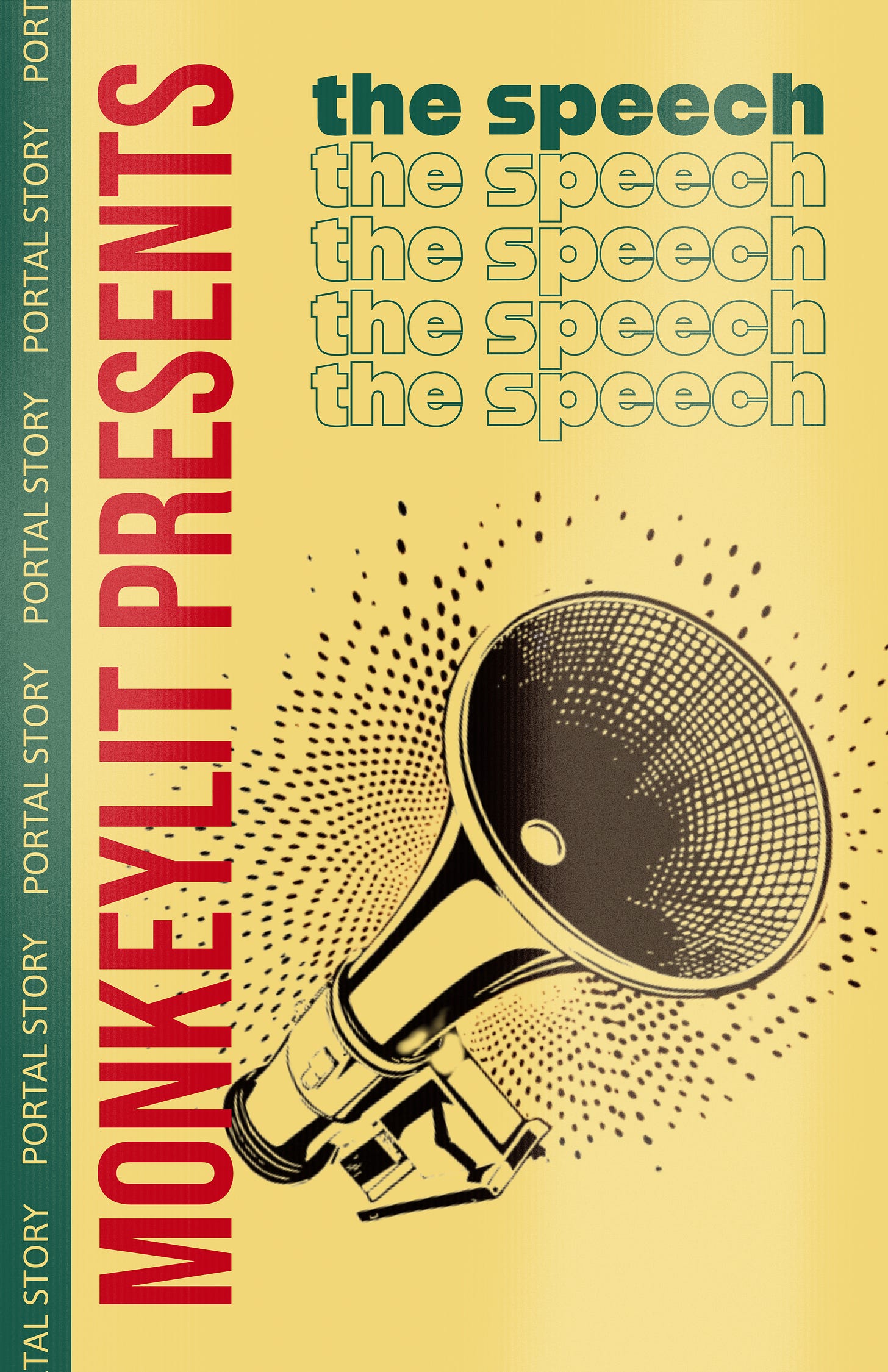The Speech
a story with multiple portals opening to different endings
They kept telling me not to worry about the Speech.
At first, it was almost reassuring, each goodwill taking a load off of my shoulders. By the fifth person, it started to become increasingly alarming.
They usually offered second-hand, shallow advice about how to address the crowd: who to thank, where to raise or lower my voice, where to put my hands. Regardless of who I talk to, they always finished their lesson with the same, ominous though well-intended prophecy, as if the very idea itself teased a disaster: “You’re going to be fine.”
Once, upon learning that I was one of the selected speakers for the next Speech, a girl with braided hair and ballet flats that I met at a bar cheerfully encouraged me. “I’m sure it’s gonna turn out great,” she said. “I mean, they’ve got to have a system, right, the Committee? They’d never choose someone who’s gonna fail. Think about this: how many people do you remember who, like, royally screwed up their speech?”
“I don’t know,” I said. “Off the top of my head — six?”
I clearly remembered one speaker uncontrollably puking in the middle of his speech —the videos were everywhere— and another with shaky legs who somehow managed to damage the stage, causing it to break down, even injuring a bunch of people. A few serious stuttering cases, a few misunderstood gestures; some speakers messing up their notes, some deciding on the worst topics possible like “The History of Scandinavian Wood” or “The Ethics of Flushing in Private and Public Places,” others unintentionally but undeniably coming off as racist or misogynistic.
As I stood behind the bars in the courtroom, I awkwardly realized that I wasn't nearly as excited as I had been when I stepped up to the platform to give the speech. It felt absurd, especially when you take into consideration that the Committee was indeed a more attentive crowd than the audience of my speech.
"Regarding the last week's events, Mr. C—," the head of the Committee began to speak, "we see malicious intent."
I had been thinking the same thing myself, actually. Did I mean anything with my speech? Was I trying to humiliate the tradition or the Committee? Did I sabotage myself?
"We also realize that this malicious intent cannot be the work of a singly individual," he continued. "Now answer me. Who urged you to make the speech titled, 'The Pornographic Categorization of the Members of the Committee'? WHO?"“Oh shit,” she said. I could tell she momentarily forgot the uplifting nature of the conversation. “I thought there wouldn’t be any, and that’d be my point – sorry.”
God. All these people with their terrible advice, suggestions, and laid-back arrogance. . . I knew that I could find no solace in them. I knew that it wasn’t their fault, either. They just lacked experience: never selected for, nor had they made the Speech themselves. When I did try to reach out to previous speakers, they either refused to talk to me like under a vow of silence, or turned out to be thoroughly incommunicado.
At first glance, I thought the tip I got was a bust again. Some shady guys mentioned that this man had once made a speech called “The Strain of Being the Best,” and they pointed me to his direction. Now, he was in ragged clothes, missing a tooth, begging on the side of the road – he reeked so bad I could smell him long before I saw him. You’d pass him by as long as he kept his mouth shut, but if he said so much as a word, he’d turn into a snake charmer, you’d find yourself drawn to him like water down a drain.
I did not want to offend him in any way, didn’t ask how he’d ended up like this, and just wanted some advice for my upcoming speech.
“Once you go on that stage,” he said, “it will be the apex of your life, and you’ll be bound to live knowing that nothing will ever be as beautiful as that moment.” That was it. He said nothing else, and treated me like a ghost haunting him after that.
I got on a bus, leaned my head against the window, and kept it there the whole ride. Got home, gathered my things, packed them in a small leather suitcase: a few pairs of underwear and thick cotton socks for the winter, a couple of shirts and spare denim. I left the house, headed North. As long as I kept running, I’d have a reason to live. I could wait for the Committee to catch up with me. I had all the time in the world. So, I had to make do with what I had: people telling me to practice in front of a mirror or speak spontaneously, engage with the audience or make as little interaction as possible, control my pace or be done with it as soon as possible. There was no one that can really tell me, teach me what to do.
Each year, a total of 240 people are chosen to make the Speech, and around 72% of them find themselves as nervous and unprepared as I did when I was first given this immense responsibility. Not anymore!
With a foolproof training program and guaranteed results, my three-week intensive Speech Course helps these people unlock their potential: choosing a compelling topic, writing a memorable speech, and delivering it with utmost professionalism.
I delivered my Speech successfully, and now I’m making sure that everyone else can do the same — at reasonable prices and with special discounts!Though none of them had ever been more than enthusiastic audience members, they sure had a lot of ideas about the Speech. You see, you could talk about it all you want, gossip about the speakers, criticize them, nitpick their texts. But discussing the Speech tradition itself, inquiring about the Committee or its criteria for selection – that was blasphemous. And yet people were eager to share whatever blasphemous thing they had on their minds in a self-destructive spree as soon as they discovered they’re in the presence of a speaker. Pseudo-rebellious teenagers and drunken group of friends late at night would drag me to the side, whispering, theorizing, Is it true that they choose the terminally ill? or I heard that the Committee members are all previous speakers, hm?
As a matter of fact, no one knew about the origin of the speech, what it meant, or how it’s become an integral part of our society. I doubt even the Committee had any idea. Some antiquarian once wrote a book claiming that the first speech was made by Cain to justify the murder of Abel with a well-structured presentation, and the speeches we make today honor this tradition in a way. The Committee was not pleased. The man vanished. People tore down his shop and everything. It was ugly.
There were more bodies than I could count – on both sides. Never mind the death, the violence, the screams, and the scene was a twisted piece of art painted in reds and oranges and purples. Occasionally, a bomb would go off, flooding everything in light, turning it into a blank canvas only to defile it again with ungodly colors.
The last line of defense had finally been breached.
“Sir,” one of my soldiers said, his finger to his ear as he received the news, “we can move on.”
We entered the massive building ahead and moved up the stairs. There was smoke still, the stench of burnt flesh lingering. We reached the room on the top floor. I gazed around, unflinching, and slowly walked toward the large desk in the center. I removed the body lying on it and took the seat.
“Sir–” the soldier said again, “the Committee has fallen. What’s the first order of business?”
I grinned.
“No more Speeches.”Nothing helped: no casual conversations with strangers, no deep contemplations, no investigations into previous speakers, no analysis of the tradition. I had nothing to talk about, no speech to give. Some ideas I came up with, they were mockingly solemn, taking themselves too seriously; some other were unbecoming – maybe perfect in someone else’s mouth but surely not mine. I became increasingly irritated, constantly on edge. Lost sleep. I’ve been sweating from the most unlikely places: my elbows and my knees, under my fingernails. Even when I swallowed, I could taste the sweat.
It had to be the best night I’ve ever had. There were five of us, five speakers. We all drank, and exchanged stories, and laughed. I think we felt wiser somehow, talking and listening with the candor of those who had gone through the same trauma.
“I wish,” I said at some point, “I’d met you guys before the Speech. We could’ve helped each other.”
“It wouldn’t have been possible,” one said. “The Committee makes sure that upcoming speakers have no contact with one another – different cities, different backgrounds.”
“They claim it makes the speeches more original and genuine,” another added.
“And I spent most of my days drunk before my speech anyways. Couldn’t even help myself.”
“Oh, but your speech was amazing! How’d you do that? I even teared up a bit!”
Another interrupted: “I feel like I’ve cheated, listening to you all,” he said. “Honestly, I did have support – I mean my wife, my parents. . .”
We stayed up all night, celebrating speeches delivered successfully, and after that, again with the candor of those who had shared the same trauma, we never saw each other again. On the morning of the Speech, I made peace with public embarrassment and social exclusion. I was mentally ready. Took a shower, had a coffee like any other day, put on a suit and a purple tie. If my name were going to be dragged through the mud, at least I was going to look sharp during the process. As I was about to leave the apartment, I came across with an envelope on the ground. Sender’s name was adorned with big golden letters: The Committee. I tore it open, pulling out the sheets of paper and quickly glancing over them.
To the Upcoming Speaker, it said, Please find the enclosed Speech prepared by the Committee.




